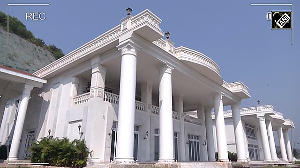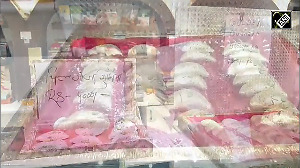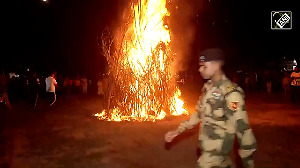Less than a week after Punjab Governor Salmaan Taseer was gunned down for criticising the blasphemy law, Judge Rao Ayub of an anti-terrorism court at Dera Ghazi Khan in Punjab handed down the sentences to 45-year-old Mohammad Shafi and his 20-year-old son Mohammad Aslam on Monday.
Shafi, who is the imam of a mosque at Muzaffargarh, 400 km from Lahore, and his son were arrested in April last year for removing a poster for a religious gathering that was pasted outside their grocery shop. The poster reportedly featured Quranic verses, officials said.
The organisers of the gathering, which commemorated the anniversary of Prophet Mohammed's birth, filed a complaint that alleged the duo had torn the poster and trampled with their feet.
After convicting the duo for blasphemy, Judge Ayub handed down two separate prison terms of five years and 10 years to Shafi and Aslam and ordered them to pay fines totalling Rs 210,000 each. The defence counsel said the verdict would be challenged in the Lahore high court.
Reports said the duo had been accused of blasphemy due to differences between the Deobandi and Barelvi sects. Shafi had differences with Haji Phool Mohammad, a man from the Barelvi school of thought who filed the complaint against the imam and his son.
Punjab's Taseer had earned the ire of religious hardliners after he spoke in the defence of Asia Bibi, a Christian woman sentenced to death under the blasphemy law last year, and called for reforms in the law to prevent its misuse.
Rights activists have alleged that the law is often misused to persecute minorities and to settle personal or political scores.
The blasphemy law, which was introduced during the regime of late military ruler Zia-ul-Haq, carries the death penalty for the worst offences.
No one convicted under the blasphemy law has been executed in Pakistan though dozens of people accused of blasphemy have been killed by radical elements.
Pakistan Prime Minister Yousuf Raza Gilani has said his government has no plan to amend the law.





 © 2025
© 2025